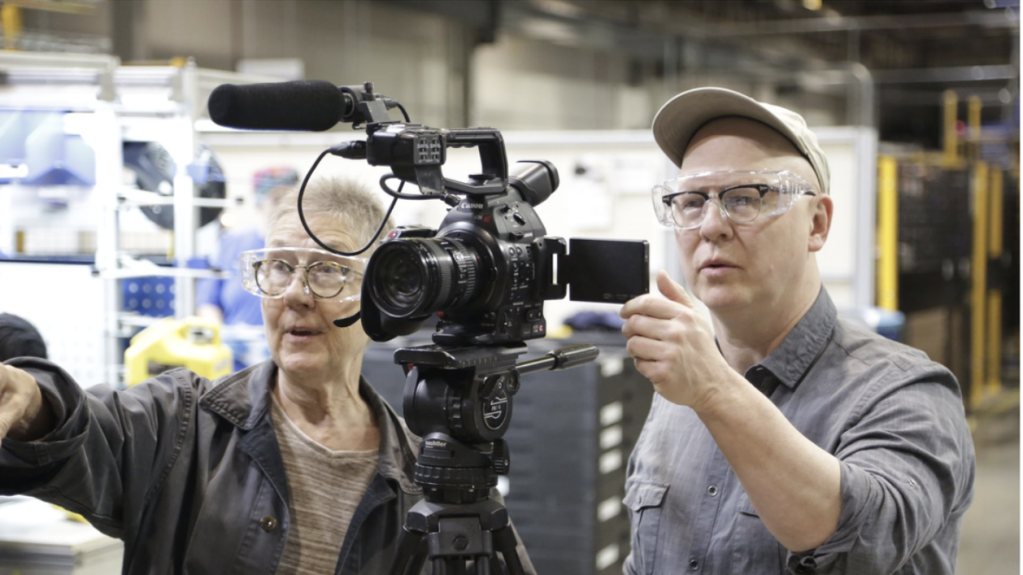The documentary community is mourning one of its most treasured artists, filmmaker Julia Reichert. The Oscar-winning director of American Factory died Thursday night at her home in Yellow Springs, Ohio of a form of cancer affecting the bladder and other organs. She was 76.
“I love this special woman… We can see her sweetness, joy, passion and love in every frame,” filmmaker Ondi Timoner wrote on Facebook. “You were a gift to us all, an inspiration for all the best parts of being human, and you uplifted everyone you touched with your work. I feel so lucky to have known you all these years.”
Two-time Oscar nominee Lucy Walker tweeted, “RIP Julia Reichert, the most beloved person in the documentary community, an angel & a beacon. I met her in 2006 at a screening of A Lion in the House which affected me so deeply we talked for hours. She’ll always inspire me. Love to partner Steve Bognar.”
Bognar and Reichert were partners in life and filmmaking. They shared directing duties on American Factory and numerous other films, including 2021’s Untitled Dave Chappelle Documentary, 2020’s 9to5: The Story of A Movement, and the Oscar-nominated The Last Truck: The Closing of a GM Plant. The latter short film, released in 2009, told the story of a General Motors factory in Moraine, Ohio that shuttered, devastating the community near Dayton.
Netflix
For years the Moraine plant sat empty, a symbol of decay in the Rust Belt. When a Chinese-owned auto glass giant bought the property years later, Reichert and Bognar returned to film American Factory, documenting the company’s anti-union practices (ironic for a company from a putatively-Communist country) and the cultural difficulties of integrating Chinese and American workers. After the film’s premiere at Sundance in 2019, former President Barack Obama and first lady Michelle Obama backed it through their Higher Ground production company.
“From the landmark feminist film “Growing Up Female” (1971) to the Oscar-winning “American Factory” (2019), Reichert documented the history of labor, the women’s movement, health care and the lives of working-class Americans,” the UCLA Film & Television Archive noted on Twitter. Prof. Patricia Aufderheide, a scholar of media and documentary, tweeted, “Julia Reichert has passed on, after 4+ years of cancer. She made three films in that time. Besides her long career in documentary, her legacy is also in the many, many people she mentored and supported.”
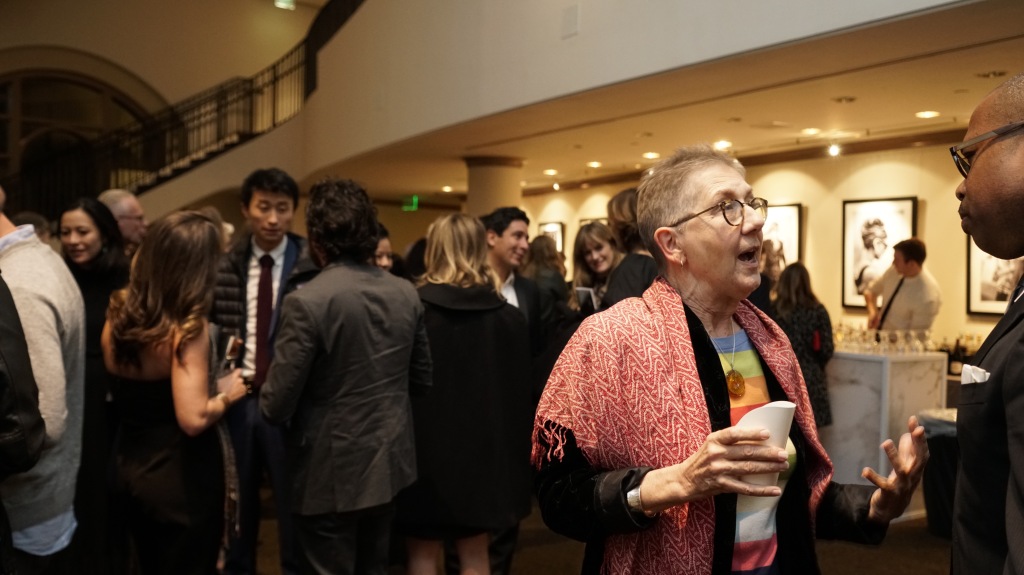
Courtesy of Matthew Carey
Reichert was a professor of cinema studies at Wright State University in Dayton, Ohio for many years. Hannah Beachler, who described herself as a student of Reichert’s, tweeted, “She was a champion of women and loved film. She took us rag tag kids and helped shape us all into filmmakers & storytellers.”
On Facebook, former IDA executive director Simon Kilmurry wrote, “Thank you Julia Reichert. You leave an incalculable legacy, a legion of filmmakers committed to truth and justice, respect and compassion. Wherever you are right now, I know you’ll be uplifting voices and holding the powerful to account. We are forever in your debt.”
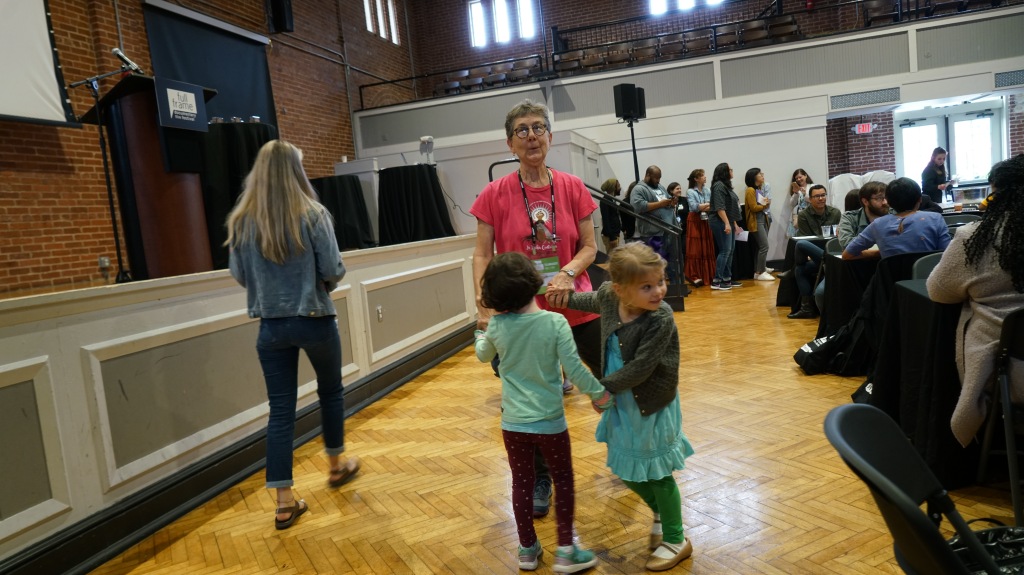
Courtesy of Matthew Carey
Tom White, editor of the IDA’s Documentary magazine, wrote, Reichert “was a warrior, an artist, an activist, a mentor, a teacher, a friend, a partner, a mother, a grandmother. For half a century, she fought for the truth. She fought her hardest battle for 15 years. She & Steve. And she kept doing what she did best–making films and sharing the love & joy, which came back to her in abundance.”
I have my own fond memories of interviewing Julia Reichert a number of times and being struck by her warmth, openness and how naturally down to earth she was. She and Steve Bognar were the rare documentary filmmakers of great stature to live outside the L.A.-NYC axis, which said so much about them and their priorities as people and filmmakers. When they took the stage to accept their Oscars, Bognar saluted the “tough, inventive, great people of Dayton, Ohio.” And Reichert made memorable remarks of her own.
After praising her fellow nominated filmmakers, Reichert said, “Our film is from Ohio and China. Go Buckeyes! Sorry. But it really could be from anywhere that people put on a uniform and punch a clock, trying to make their families have a better life. Working people have it harder and harder these days. We believe that things will get better when workers of the world unite.”
I spoke with the couple in 2020, a few months after their Oscar victory.
“When I got to get up there and give my little speech — which we had worked on obviously, as everybody does — I felt like I was winning something for Ohio. I was winning something for Dayton. I was winning something for our hard-hit little part of the world that had been through such job loss and we’d just been through nasty tornadoes and we’d been through a mass shooting,” Julia told me. “We’d given a lot of [acceptance] speeches, right? The PGA, and the this and the that. We always tried to talk about the workers in the room, or the workers who were underpaid and the wage gap. Millionaires building skyscrapers at the same time as people getting cheated out of their wages and not getting taken care of.”
She continued, “We knew we were going to use that phrase, ‘Workers of the world unite,’ in the Oscars. When each of us [Julia and Steve] went to our corner, and you know how we take little notes. We brainstorm alone and then we come together usually. ‘Workers of the world unite’ — we both had put that as, ‘Okay, we have to say it somehow. We have to get those words out.’ And I did, and I feel really good about that. And I also feel really oddly good that when I used the word Ohio — I think I said, ‘Workers in Ohio and China’ or something — and there was this burst of clapping in the audience, there were so many Ohio people there. I just sort of absentmindedly when I heard that looked up and said, ‘Go Buckeyes!’”
“You impulsively did it,” Steve noted.
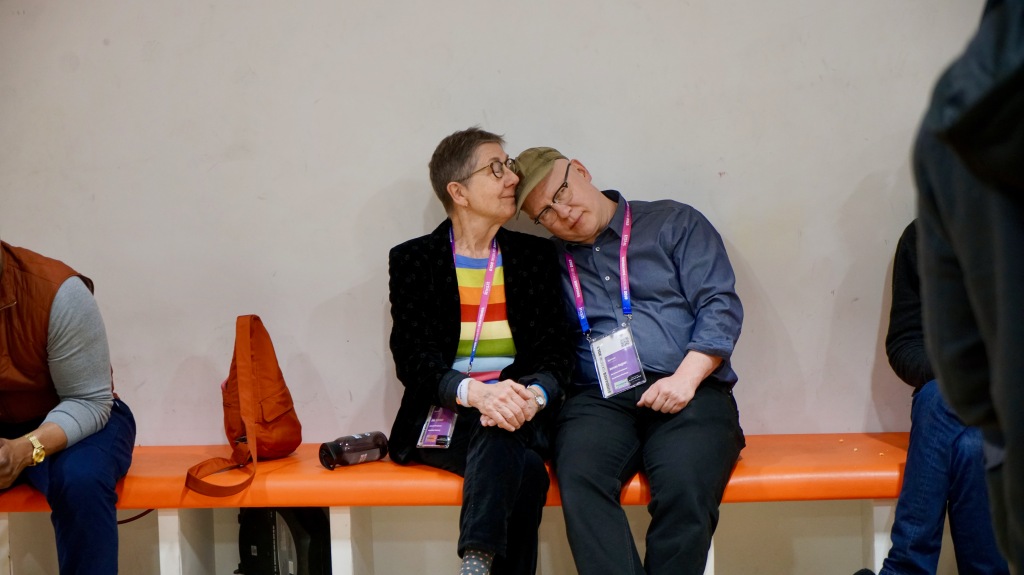
Courtesy of Matthew Carey
Julia and Steve told me they hadn’t had the opportunity to speak at length about their Oscar experience, and enjoyed the chance to recount it. They recalled meeting various luminaries after the ceremony, including actor Mark Ruffalo, who had presented the Best Documentary Feature category.
“He had seen the film and he really wanted to talk about it and he was so, so supportive. And people would come out of the shadows. I remember we were sitting for a second and all of a sudden Will Ferrell comes out of the shadows and says, ‘I loved your film, congratulations.’ Leonardo DiCaprio comes out of the shadows. Laura Dern is right after us. I mean, you asked about the Oscars and nobody’s asked us about that, so we’re telling you everything here. There is something different about winning from being nominated. It’s like suddenly, for those moments at least and the next days or whatever, you feel like you’re all on the same plane. It doesn’t matter if you’re Tom Hanks or Laura Dern or Bong Joon-ho or any of those people, you’re all in it together. You suddenly feel this strong sense of a community that is actually caring. They’re really a caring group of people who recognize you and celebrate you. What’s the name of this actor who kissed me as I walked out?” she asked Steve. “It was a beautiful little kiss.”
“Joaquin Phoenix,” Steve replied. ‘Julia passed Joaquin Phoenix and said, ‘Great speech.’ He looked at Julia and—”
“My bald head,” Julia clarified.
“Julia’s been on chemo, so she was bald for the Oscars. And he just leaned in and he gave her, first of all, a very beautiful look, but then he leaned in and gave her a kiss on the cheek. It was just lovely. A very tender moment.”
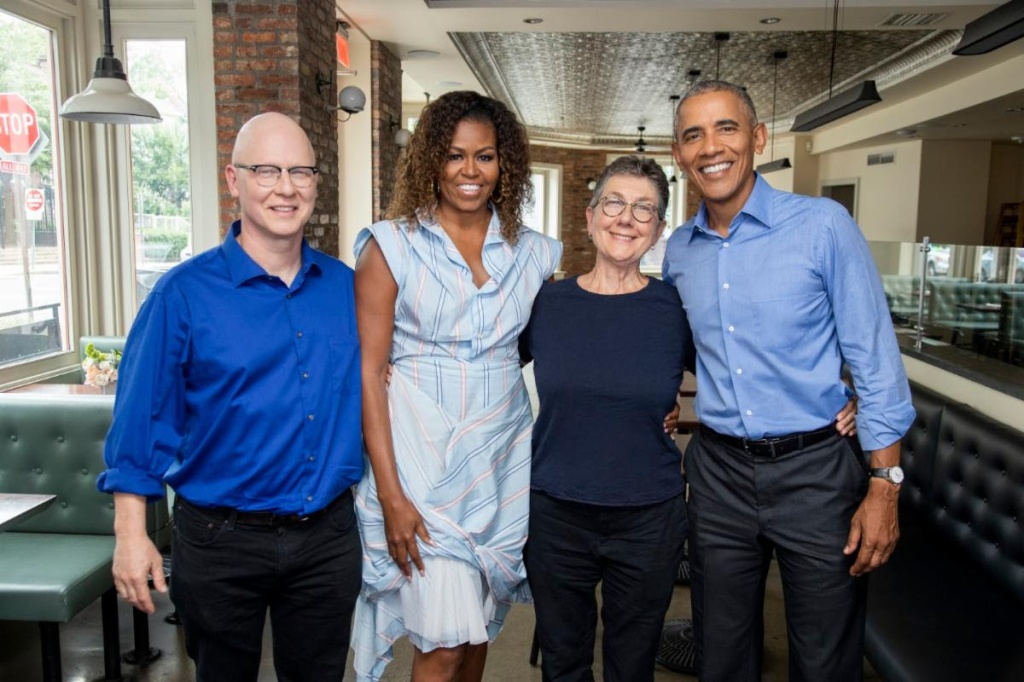
Netflix
We spoke by phone and I didn’t realize Reichert had been in bed during the conversation, recovering from her latest chemo treatments.
“It’s helpful to get out of your head and do something like talking with you,” Julia said. “I am still in bed talking, but it’s a beautiful day.” She added, “I’m sitting here in bed looking at a beautiful bouquet, gorgeous, of white flowers that came the day of the Emmy nominations, and it was from ‘BO, MO,’ and Higher Ground, with a congratulatory note.” (Reichert and Bognar went on to win the Emmy for Outstanding Directing for American Factory).
Reichert added, “It didn’t take long to figure out who ‘BO’ and ‘MO’ were. Since I was sick I put out a thing called CaringBridge where I post, or sometimes if I’m too sick, Steve or my daughter will post an update. And when I had a big setback during the year after we signed up with them [Higher Ground and the Obamas], I got individually, beautifully written, handwritten letters from each of them, and it just meant the world to me, that it wasn’t just like, ‘Get well soon,’ with flowers. It was really a letter from each of them.”
I can only echo the words of Oscar-winning filmmaker Alex Gibney, who tweeted, “Julia Reichert. Requiescat in pace. So courageous. So delightful. And so committed to visions of social justice.”

